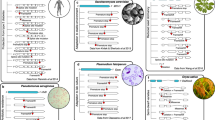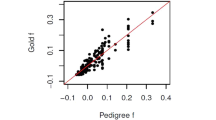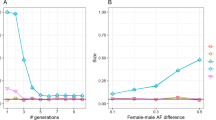Abstract
A MAJOR effort in theoretical population genetics has been aimed at developing statistical tests to distinguish between various explanations of observed patterns of enzyme variation1. Perhaps the most useful result to emerge from this effort is Ewens' sampling theory of neutral alleles2. This theory allows one to use the number and configuration of alleles in a sample to test for departures from neutrality. Watterson3 has derived the analogous sampling distribution for a finite population subject to the joint effects of mutation and symmetric heterotic selection. It differs from the neutral sampling theory, providing a stronger hypothesis-testing situation than has previously been available. In this note I present a third sampling distribution. It applies to an infinite population in which the selective coefficients fluctuate at random through time and space. Quite unexpectedly, the sampling distribution turns out to be identical to that for the neutral model, indicating that agreement of data with Ewens' sampling distribution does not rule out the possibility that natural selection is responsible for the genetic variation in the sample. Furthermore, the properties of random-selection populations at equilibrium are indistinguishable from neutral-allele populations for observations made at a single time point. This result calls into question the claim that agreement of data with predictions of the neutral model argues against natural selection as an important factor for the maintenance of genetic variation.
This is a preview of subscription content, access via your institution
Access options
Subscribe to this journal
Receive 51 print issues and online access
$199.00 per year
only $3.90 per issue
Buy this article
- Purchase on Springer Link
- Instant access to full article PDF
Prices may be subject to local taxes which are calculated during checkout
Similar content being viewed by others
References
Ewens, W. J. & Feldman, M. W. in Population Genetics and Ecology (eds Karlin S. & Nevo, E.) 303–338 (Academic, New York, 1976).
Ewens, W. J. Theor. Pop. Biol. 3, 87–112 (1972).
Watterson, G. A. Genetics (in the press).
Gillespie, J. H. Am. Nat. 108, 145–151 (1974).
Gillespie, J. H. & Guess, H. Am. Nat. (in the press).
Gillespie, J. H. Am. Nat. 110, 802–821 (1976).
Gillespie, J. H. Evolution (in the press).
Kimura, M. J. appl. Prob. 1, 177–232 (1964).
Wright, S. Evolution and the Genetics of Population 2, (University of Chicago Press, 1969).
Kingman, J. F. C. J. R. Statist. Soc. B 31, 1–22 (1975).
Kingman, J. F. C. Theor. Pop. Biol. (in the press).
Watterson, G. A. J. appl. Prob. (in the press).
Yamazaki, T. & Maruyama, T. Science 198, 56–58 (1973).
Kimura, M. Johns Hopkins Med. J. 138, 253–261 (1976).
Johnson, G. & Feldman, M. W. Theor. Pop. Biol. 4, 209–221 (1973).
Nei, M., Fuerst, P. A. & Chakraborty, R. Nature 262, 490–493 (1976).
Author information
Authors and Affiliations
Rights and permissions
About this article
Cite this article
GILLESPIE, J. Sampling theory for alleles in a random environment. Nature 266, 443–445 (1977). https://doi.org/10.1038/266443a0
Received:
Accepted:
Published:
Issue Date:
DOI: https://doi.org/10.1038/266443a0
This article is cited by
-
A model of weak selection in the infinite alleles framework
Journal of Mathematical Biology (1986)
-
A sampling theory for local selection
Journal of Genetics (1985)
-
An analysis of neutral-alleles and variable-environment diffusion models
Journal of Mathematical Biology (1982)
-
Temporally varying selection on multiple alleles: A diffusion analysis
Journal of Mathematical Biology (1981)
-
Are evolutionary rates really variable?
Journal of Molecular Evolution (1979)
Comments
By submitting a comment you agree to abide by our Terms and Community Guidelines. If you find something abusive or that does not comply with our terms or guidelines please flag it as inappropriate.



